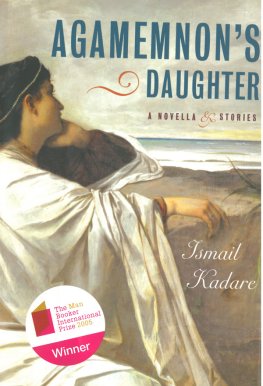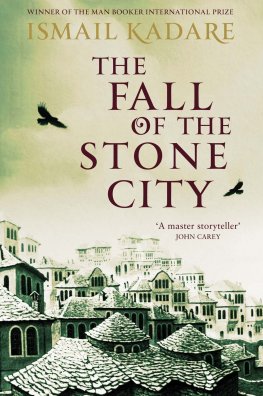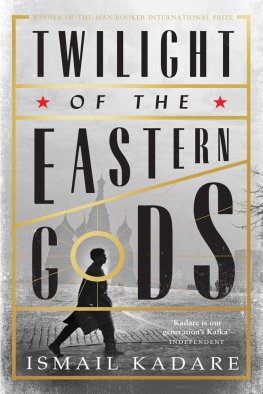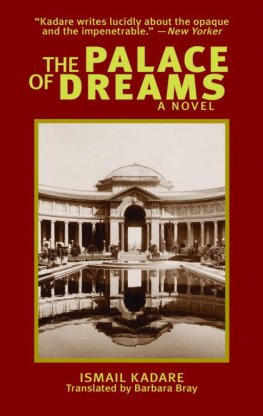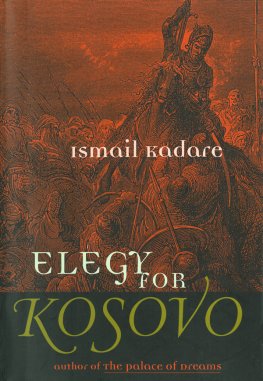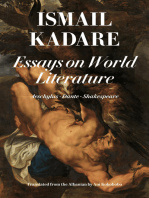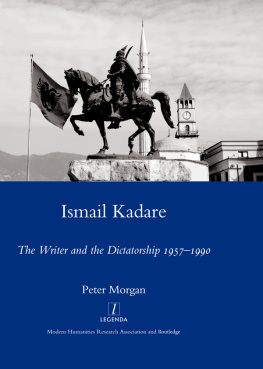Ismail Kadare
The Ghost Rider
Have you ever read Brgers Lenore? asks the narrator of Ismail Kadares Twilight of the Gods of the Steppes, as he wanders along a beach with a girl, at a writers retreat in Soviet Latvia. Or Zhukovskis Ludmilla? Its the same story, you know. He translated it from Brger.
So who did Brger steal it from? the young woman asks.
I opened my mouth to say From us! but managed to stop in time so as not to put myself in the position of those representatives of small nations ever eager to say we, our people, in our land with a kind of pride or bombast that I found depressing because it always struck me that they didnt believe what they were saying either.
The story in question is The Ballad of Constantine and Doruntine, an ancient tale that is known wherever Albanian is spoken within the current borders of the state, among the Arbersh of southern Italy, in Kosova, Montenegro and Macedonia. Versions of it exist in every Balkan language and in several other European folk traditions. It was put into verse (and liberally altered) by the German Romantic poet Gottfried August Brger (17481794) in the famous ballad Lenore, which is where Edgar Allan Poe probably found the name that he used in his own dirge, Lenore. Known in folklore studies as the Lenore motif, the legend tells of a brother (Constantine, or Kostandin in Albanian) who rises from his grave to fulfil his promise of bringing his married sister Doruntine back from a far-off land to see their dying mother. The Ghost Rider tells the same story from an unconventional perspective that of the detective whose task it is to unravel what really happened.
Like the legend of Rozafat the bridge made safe by walling up a living victim inside it, developed most fully in The Three-Arched Bridge and recalled, from a great distance, in The Great Wall the story of Kostandin and Doruntine is a recurring motif in Ismail Kadares vast oeuvre. The Ghost Rider is Kadares fullest exploitation of what might first seem just a Gothic treasure of Albanian national folklore, save that Kadare is reluctant from the start, as the passage from his early novel of life in the Soviet Union suggests, to cast himself or his narrator as a representative of a small nation ever eager to say we, our people, in our land He would rather see himself as a representative of literature, a messenger from a broad, deep and mysterious place, telling stories that echo far beyond the boundaries of any one land.
The Twilight of the Gods of the Steppes was first drafted shortly after Albania broke off relations with the Soviet Union in 1960. The Ghost Rider was written fifteen years later, after Albania broke off relations with the Peoples Republic of China, and thus found itself once again radically isolated a tiny nation a few hours boat ride from Bari but a million miles from the concert of nations in the economic, cultural and political spheres. For Kadare, the Lenore motif rises up from the deep memory of national folklore at times when relations with the outside world are cut off. In the 1960s, Soviet Albanian couples must have found themselves in situations reminiscent of Doruntines, if not of Kostandins. It may be especially significant that for his major treatment of the theme he uses a version of the ballad coming not from Albania proper, but from the Arbresh tradition of southern Italy. Marrying out, even into the Albanian-speaking communities of nearby Sicily, was quite unthinkable at that time. Folktale and fiction allow Kadare to take a subtly contrary path that thinks the unthinkable without seeming to deal with present issues at all.
Kadares own position in the later 1970s was not an easy one. Translations of his work had been appearing in Paris since 1970 and he was now widely known in the West. That gave him a degree of protection, but at the same time made him especially vulnerable to accusations of collusion with the enemy for why would bourgeois readers praise him so highly unless his novels were somehow speaking to bourgeois interests? Subjected to public anathema and to an excruciating self-criticism session at the Writers Union over his poem The Red Pashas in 1975, he was subsequently rusticated to the provincial city of Berat for the best part of a year, and banned from publishing novels for an indeterminate period (despite being at the same time an appointed member of the Peoples Assembly). For that reason, Kadares novels of the later 1970s which in retrospect can be seen as the most creative period in his life were disguised as short stories; several of them, including Broken April and The Ghost Rider, were published in a collection entitled Cold Blood in 1980.
During this period, Kadares works were regularly translated into French inside Albania by his long-standing collaborator, Jusuf Vrioni, and his retelling of the Ballad of Constantine was brought out by Fayard in 1986 as Qui a ramen Doruntine? a literal translation of the Albanian title. It came into English much more quickly than most of Kadares works, translated from Vrionis French by Jon Rothschild in 1988, as Doruntine. Over the following twenty years, the paranoid Stalinist regime of Enver Hoxha collapsed and disappeared, Ismail Kadare moved to Paris and, once there, undertook to republish his complete works in matching volumes in Albanian and French, organised by the historical periods of the novels action. The Ghost Rider, set in a generic Middle Ages, (preceded only by The Pyramid, set in Ancient Egypt, and short stories set in the mythological or classical past) was therefore included in Volume 1, published in 1993, in a significantly reworked and expanded version.
The revisions made by Kadare are essentially of an artistic nature replacing brief generalities with additional narrative, including a few new named characters, or else expanding dialogues to give a fuller sense of the issues at stake but they also include the restoration of historical and political references it would have been unwise to include during the Hoxha regime, notably to religious practices and, in this novel, to discussions that imply the possibility of disagreement with state authority. Even so, it requires a leap of our imaginations to read in the character of Kostandin, as he is recalled by his comrades in chapters six and seven, a figure of resistance and dissidence. Yet that is what he is, and also what makes him unique in Kadares universe, which usually suggests the human values that it promotes by antiphrasis, understatement and what another critic has called the device of distant echo.
The medieval setting of The Ghost Rider is never precisely dated in the legend, but Kadare took care to connect his version of the story to the general history of his country. Albania occupies an area that was formerly the Roman province of Illyria, and it was Christianised very early on. When the Roman Empire divided in 378 AD, Albania was assimilated into the Eastern Empire based on Constantinople (Byzantium), but when the churches of Rome and Byzantium divided in the eleventh century, the Albanian lands remained predominantly Catholic. The area was frequently raided and partly colonised in turn by Bulgars, Serbs, Venetians and Norman knights, and between the eleventh and fourteenth centuries it found itself at the wavering frontier between Roman Catholicism and the Eastern Church. Out of these turbulent times, and pending the greater conflict between the Ottomans and the European powers which would see Albania absorbed into the Muslim world for many centuries, a nation that at that time called itself Arbria was slowly emerging.
The Ghost Rider relates the legend of Doruntine to the invention or emergence of the


